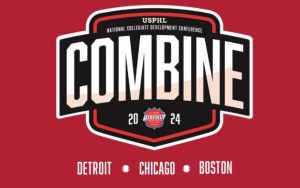WCRHL teams gearing up for 2022-23 season after successful 2022 nationals event

The National Collegiate Roller Hockey Championships took place April 6-10 in Kalamazoo, Mich., with all five divisions represented.
It was a full return to the playing court since the 2019 championship tournament, and much of the same is anticipated for the upcoming 2022-23 season.
“The 2022 National Collegiate Roller Hockey Championships saw us get back to a full season of collegiate roller hockey, culminating in this five-day event,” National Collegiate Roller Hockey Association (NCRHA) executive director Brennan Edwards said. “The event was a good step forward from the COVID years where we lost one full year of collegiate roller hockey and two national championships. We are hopeful that our 2023 event will be larger again, building back towards what it was pre-COVID.”
Teams from the Western Collegiate Roller Hockey League (WCRHL) were represented in every division at April’s national finals, totaling eight teams.
West Valley College finished runner-up to Henry Ford College in the Junior College Division while Arizona State University (Division 1), Cal Poly San Luis Obispo (Division 2) and the University of Arizona (Division 3 and Division 4) all advanced to the semifinals in their respective divisions. Additionally, CSU Fullerton (Division 2 and Division 4) made it as far as the quarterfinal playoffs.
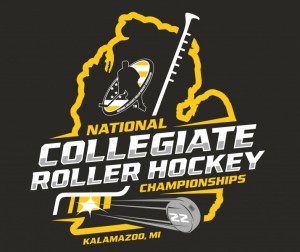 Puck drop
Puck drop
Teams from the Junior College Division did not attend regional championship tournaments, as they advanced directly to the national championship tournament.
The WCRHL championships took place March 5-6 at Corona Inline with 11 teams represented from throughout California and Arizona.
West Valley finished as one of the WCRHL’s stronger teams during the 2021-22 regular season with a 9-5 record with two overtime losses against teams from other divisions.
Henry Ford entered the 2022 National Collegiate Roller Hockey Championships with an 8-9 record while similarly playing a strong inter-divisional schedule in the Midwest Collegiate Roller Hockey League.
West Valley struck first with a 4-3 overtime win in Game 1 but Henry Ford responded with three consecutive wins to capture the best-of-five national championship series three games to one. Of the four games, two were decided by one goal.
Henry Ford won Game 2 by a tight 4-3 score and pulled away in the last two games by scores of 8-2 and 8-0 to claim the 2022 national championship title.
Sebastien Paquet scored just six seconds into Game 1, but Henry Ford responded with three consecutive goals to take a 3-1 lead through two periods. The Vikings scored the only two goals in the third period – one each by Paquet and Justin Ta – to send the contest into overtime, where Joshua Viller netted the game-winner, assisted by David Swanson and Paquet.
West Valley swept the three star awards. Paquet received first star billing with two goals and one assist while Ta (one goal, one assist) was named second star of the game whiles goaltender Caleb Cueba earned the third star with an .893 save percentage (25 saves on 28 shots).
Henry Ford came back to even the series in Game 2 despite two goals and one assist from first star of the game Chad Payne from West Valley.
Henry Ford outscored West Valley 23-9 in the four games. Devin Stroia paced the JC Division national champions with six goals and 11 points while Paquet led the Vikings with nine points (three goals, six assists).
All-tournament selections for West Valley included Paquet (first team), Payne (second team), Viller (second team), Cueba (second team), Ta (honorable mention), Austin Trenner (honorable mention) and Swanson (honorable mention).
Henry Ford swept the top player awards: Dylan Pattenaude (MVP), Carter Pattenaude (MVG) and Stoira (Playmaker). Carter Pattenaude posted a .902 save percentage.
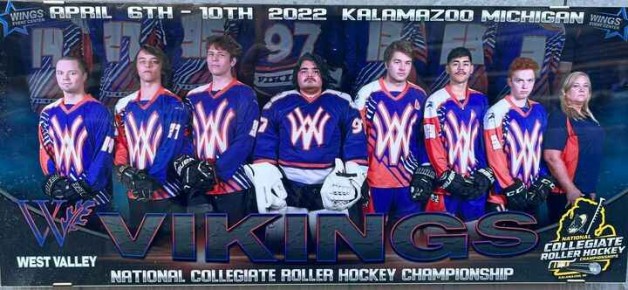
Overall, four programs skated off the floor with national championships in Kalamazoo.
Lindenwood University defeated Slippery Rock University, 7-2, to win the Division 1 championship while Michigan State defeated Northeastern University, 2-1, to claim the Division 2 title.
Ohio State University rolled past the State University of New York-Cortland, 6-4, to capture the Division 3 championship while Lindenwood and Slippery Rock rematched at the Division 4 level, with Lindenwood recording a decisive 10-0 victory.
“The 2022 event saw a lot of great competition, in both the Division 1/2 combined division and then in Division 3,” Edwards said. “Division 3 was really anybody’s game. University of Arizona did great, but in the end, it was Ohio State getting the Division 3 championship. Lindenwood University won Division 1, Michigan State University won Division 2, Henry Ford College won the Junior College Division, and Lindenwood took the Division 4 title as well.”
Making the grade
The split for the Division 1 and Division 2 playoffs took place in Kalamazoo with 12 of the NCRHA’s elite teams, including three from the WCRHL, competing in round-robin pool play to determine placement for the championship playoffs.
Arizona State University and CSU Fullerton both finished 2-1 in their respective pools while Cal Poly San Luis Obispo was 0-3.
When teams were separated into playoff divisions, Arizona State was placed in the Division 1 tier (four teams) while Fullerton and Cal Poly were placed in the Division 2 tier (eight teams).
“This was one of the more interesting formats we played in this year in terms of the pooling and round robin format,” ASU program director Nick Boyarsky explained. “Our goal going in was to make the Division 1 bracket first and foremost out of the combo Division 1/Division 2 pool we were in, and we accomplished that goal. Once the field narrowed to four it was on us to win our semifinal and move on. With a goalie and some key players banged up, we came up short on the win.”
ASU, the reigning WCRHL Division 1 champion, defeated Fullerton (2-0) and Stony Brook (7-1) while absorbing a 3-1 loss to Bethel in pool play.
Mason Parker scored both goals against Fullerton while goaltender Lane Hartwell posted a 15-save shutout. Parker’s second goal, an empty netter, sealed the pool-round victory as Fullerton’s Kurt Yano kept the game close with 16 saves on 17 shots he faced (.941 save percentage).
Both ASU goals came in the third period as the teams played to a scoreless draw through two frames.
Paxton Parker racked up two goals and two assists, Chase Steele recorded a hat trick and Hayden Knight collected two goals and one assist in the Sun Devils’ pool win over Stony Brook.
Michael Bloom scored the lone goal against Bethel while Hartwell stopped 27 of 30 shots (.900 save percentage) in the setback to Bethel.
The four Division I semifinalists included Lindenwood, Bethel, Slippery Rock and Arizona State. The Sun Devils dropped a tight 2-0 contest against Slippery Rock. Lindenwood eliminated Bethel, 5-1, in its semifinal draw en route to claiming the 2021-22 national championship with an ensuing win over Slippery Rock.
In ASU’s semifinal matchup against Slippery Rock, there was no scoring in the first period. John Hirst put Slippery Rock ahead, 1-0, with the lone goal in the second period while Dylan Zelonka scored a shorthanded insurance goal in the third period.
Slippery Rock posted a narrow 21-17 advantage in shots. Hartwell made 17 saves for ASU while Logan Johnson recorded a 17-save shutout for Slippery Rock.
Steele received second-team recognition on the Division 1 all-tournament team while Hartwell, Knight, Mason Parker and Paxton Parker were named honorable mentions.
Lindenwood’s Nicholas DellaMorte was named division MVP wile Lindenwood’s Jacob Robinson was named division MVG. The division playmaker award went to Slippery Rock’s Ian Edwards.
“This season saw a lot of progress for the D1 team by winning regionals and beating some very good out of region teams early in the second semester in Chicago,” ASU’s Boyarsky noted. “The leadership of graduating seniors; Paxton Parker, Chase Steele, and club president Hayden Knight, made the season what it was.”
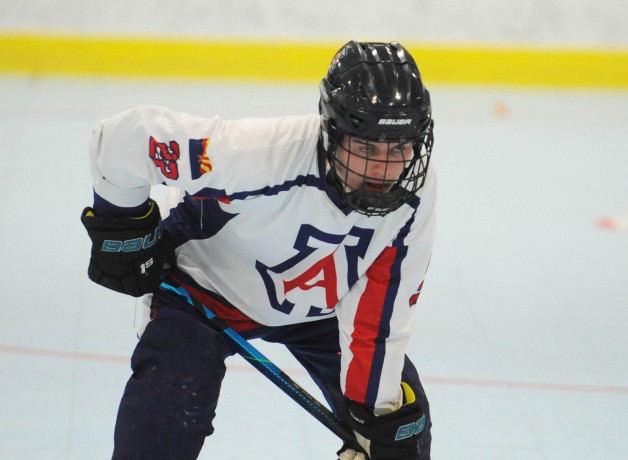
Following the tight loss to WCRHL rival ASU, Fullerton defeated UMass (5-3) and Northeastern (6-5 in an overtime shootout) to round out pool play. The Titans, the WCRHL Division 1 runner-up, then lost a double overtime 3-2 overtime matchup against Stony Brook in the playoff quarterfinals.
Fullerton swept the three star awards in its pool win over UMass while opening up a 5-0 lead: Troy Yano bagged first star honors with two goals and two assists while Ethan Flores (second star) and Ruslan Patterson (third star) both collected one goal and one assist.
The Titans also swept the three star awards in the pool win over Northeastern, with Yano (three goals, two assists), Patterson (one goal, three assists) and Jared Nelson (one goal, one assist) doing the damage on the scoreboard. Patterson scored the game-winning shootout goal.
In the playoff game against Stony Brook, Fullerton’s final game of the season, neither team scored in the opening two periods. The Titans eventually took a 2-1 lead on goals by Nelson and Patterson (a power-play tally assisted by Nelson and Troy Yano). But the New York team tied the game in dramatic fashion on a last-second goal by Scot Lawson.
Fullerton was unable to take advantage of a power play opportunity in the first overtime period and Sean Hart ended the game at 1:07 of the second overtime in favor of the Seawolves. Hart, with two goals and one assist, was voted the game’s top star.
Fullerton’s Troy Yano earned selection to the Division 2 all-tournament first team while teammates Nelson and Patterson received honorable mention honors.
Cal Poly SLO, the WCRHL Division 2 champion, lost 9-1 to Lindenwood to open pool play and followed with losses to Michigan State (6-0) and Robert Morris (7-5). However, the Mustangs rebounded with a respectable showing in the playoffs. The Mustangs rode past Farmingdale, 7-4, in the quarterfinals before ending their season with a gritty 6-4 loss to Northeastern in the semifinals.
Nathan Kartzaroff, SLO’s regular season scoring leader, had two goals in pool play while teammate Jared McMullen and E.J. Gabriel both notched one goal and two assists.
Katzaroff tallied top star honors with one goal and three assists in the playoff win over Farmingdale while Derek Le earned second star honors with two goals and one assist.
The Mustangs met Northeastern (3-2 win over UMass) in the semifinals. That game, which turned out to be Cal Poly’s last of the season, was hotly contested with an empty-net goal eventually providing the insurance marker for the victorious Huskies.
The Mustangs, playing from an early 2-0 deficit, narrowed the score to 3-2, 4-3 and 5-4 margins as the game progressed. Katzaroff cemented third star honors with one goal and two assists while Le and McMullen both chipped in with one goal and one assist, Sam Blakewell had one goal and Ryan Fehrenbach had two assists.
Goaltender Jack Conlon made 16 saves on 20 shots in the game against Farmingdale and had nine saves on 14 shots in the game against Northeastern.
Conlon, Katzaroff and Le all received honorable mention on the all-tournament team.
Michigan State edged Stony Brook, 3-1, to meet Northeastern in the championship game.
Top player awards in the division included Northeastern’s Thomas Keith (MVP), Michigan State’s Rob Kowalczyk (MVG) and Michigan State’s Grant Burkhard (Playmaker).
Best of the rest
The University of Arizona and UC Santa Barbara represented the WCRHL in the Division 3 tier at nationals while the University of Arizona and CSU Fullerton participated in the Division 4 tier.
Both Wildcat teams excelled.
“The NCRHA finals in Kalamazoo was very exciting,” University of Arizona club president Griffin Sherwood said. “Going into it, our Division 3 team was undefeated in our division and we had high hopes to win the tournament.
“We won our three round robin games, beating Colorado in overtime, Maryville, 8-0, and Boston, 5-2. We won our first playoff game 8-2 against Tampa. However, we played Cortland in the semifinals game, and we ended up losing in overtime (2-1). This was incredibly heartbreaking, especially for the four graduating seniors and one Master’s student who won’t be returning next year.
“However, we feel that we still have a strong core group of players, and we’ve also been recruiting heavily, so we hope this upcoming season will be even more successful.”
The reigning WCRHL Division 3 champion Wildcats opened pool play with a 2-1 overtime win over Colorado as Dylan Smith opened scoring in the first period for Arizona and Jack Sapra scored the overtime winner to set the tone for the Wildcats in Kalamazoo.
Arizona swept the three star awards as goaltender Ethan Zorbas collected the first star with 18 saves on 19 shots (.947 save percentage) followed by Sapra (second star) and Smith (third star).
The Wildcats swept the three star awards in the decisive win over Maryville as well with Hudson Fox (three goals), Sapra (one goal, three assists) and Ryan Lothman (two goals) leading the offensive charge while Zorbas recorded a nine-save shutout as Arizona made a statement with a 27-9 advantage in shots.
The Wildcats snapped a 2-all tie with the Terriers on the strength of three third-period goals to hand Boston the 5-2 defeat. Arizona once again swept the three star awards: Alec Cadieux (three goals), Lothman (one goal, one assist) and Smith (one goal). Zorbas stopped 12 of 14 shots he faced to improve to 3-0 in pool play with a .90 GAA with one shutout and a .929 save percentage.
Sapra finished pool play as the team’s top scorer with two goals and three assists while Lothman and Cadieux both contributed three goals and one assist. Smith had two goals and two assists while Kevin Bird chalked up four assists.
All 12 teams in the division qualified for the playoffs; eight teams participated in the first round, with the four winners advancing to the quarterfinals to face the four byed teams.
Arizona was among the four teams receiving byes. The Wildcats raced past Tampa as Smith racked up two goals and two assists, Sapra collected one goal and two assists, Fox scored twice and Zorbas stopped 12 of 14 shots (.857 save percentage) as the Tucson-based club roared to a 6-0 lead in the game.
But Arizona’s march to the championship took an unexpected detour with the OT loss to Cortland.
Neither team scored in the first and third periods. Cortland’s Michael Miano scored the game’s first goal in the second period and Saahil Ahuja followed with a shorthanded goal 89 seconds later to tie the score.
Cortland held the upper hand in shots 30-14 through regulation, though each team took one shot in the overtime period. Miano made his shot count as the game-winner at 2:25 of the extra period.
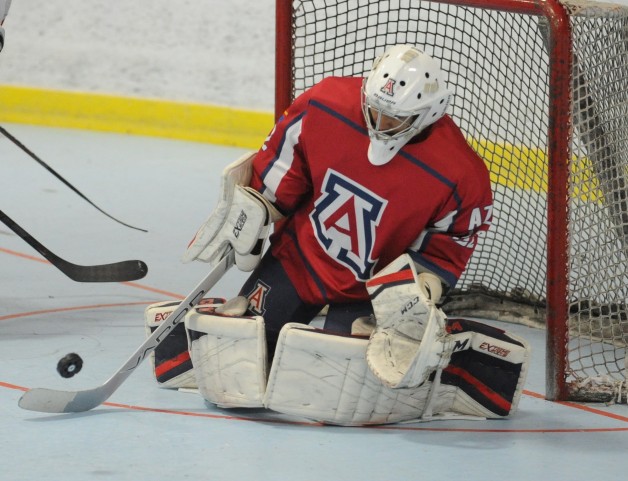
Zorbas received the No. 2 star in the semifinal loss after making 29 saves on 31 shots (.935 save percentage).
Fox earned selection to the all-tournament second team while Sapra, Zorbas and Bird were named honorable mentions.
UC Santa Barbara, the WCRHL Division 3 runner-up in 2021-22, lost all four games its played in Kalamazoo, finishing 0-3 in pool play with a 5-3 loss to Boston in the opening round of the playoffs.
The Gauchos lost, 2-1, to eventual division champion Ohio State to face off pool play, then followed with a 9-1 loss to Endicott (the 2018-19 division champion). Santa Barbara closed out pool play with a 6-5 setback to Tampa.
Brad Price led the Gauchos in pool scoring with four goals. He had the lone goal against Ohio State while UCSB goaltender Andre Martins Rodrigues stopped 21 of 23 shots (.913 save percentage).
Reyes LeGrande scored the lone goal against Endicott while Price (three goals) and Aidan Evans (two goals) lit up the scoreboard against Tampa.
The playoff game against Boston was highly competitive with both teams playing to a 1-1 standoff through the opening period. The Terriers shot ahead 5-1 before the Gauchos rallied with two late goals to make the final score close. Price had a big game with a hat trick while Martins Rodrigues stopped 28 of 33 shots (.848 save percentage) in Santa Barbara’s final game of the season.
Ohio State’s Robert Strianese earned division MVP honors while teammate Louie Garcia was named MVG. Cortland’s Miano received the division playmaker award.
Six teams participated in the Division IV tier, including two from the WCRHL.
An undermanned Arizona team got off to a rocky start with a 15-0 loss to eventual national champion Lindenwood before engaging Michigan State and UMass in a pair of close setbacks, 3-2 and 4-3, respectively.
Lindenwood outshot Arizona 44-4 with Wildcats goaltender Rene LeBlanc making 29 saves.
Grady Sherwood scored both goals in the loss to Michigan State while LeBlanc stopped 28 of 31 shots (0.903 save percentage). Theo Hannah had a pair of goals in the loss to UMass while LeBlanc made 27 saves on 30 shots (.900 save percentage).
Fullerton also finished 0-3 in pool play with losses to Michigan State (6-2), UMass (7-2) and Fullerton (16-0).
Ethan Kreller and Albert Godinez scored single goals against Michigan State while Zachary Grago made 23 saves on 29 shots (.793 save percentage). Kreller and Cody Delzer scored goals for the Titans against UMass while Grago stopped 18 of 25 shots (.720 save percentage).
Lindenwood and Slippery Rock both received byes to the semifinals while Michigan State defeated UMass, 5-1, and Arizona topped Fullerton, 5-3, in quarterfinal matchups.
Lindenwood pushed aside Michigan State, 11-1, in the semifinals while Slippery Rock ended the Wildcats’ stay in Kalamazoo with an 8-2 victory.
Lindenwood capped its monstrous 5-0 run at this year’s nationals with a 10-0 championship game victory. The Lions outscored their five opponents 61-2.
Arizona’s Zachary Kavanagh led all scorers in the quarterfinal match with two goals and two assists as first star of the game while Hannah earned second star of the game honors with one goal and one assist. Fullerton’s R.J. Prewitt earned the third star award with two goals.
Christopher Mucha braced Fullerton with 12 saves on 17 shots (.706 save percentage) while LeBlanc had 17 saves on 20 shots faced (.850 save percentage).
Colton Herr and Hannah each scored goals in the season-ending semifinal loss for the Wildcats.
Arizona’s Hannah, and LeBlanc and Grady Sherwood all received honorable mention recognition on the all-tournament team.
“Our Division 4 team faced many challenges in the tournament,” Griffin Sherwood said. “To start, due to issues with travel and school, many of the players could not attend, so we only had five skaters and one goalie, leaving the team with one sub.
“We lost their first three games but won the fourth against CSU Fullerton, which has been somewhat of a West Coast rival for our team all season. This allowed us to seed into the semifinals; we lost to Slippery Rock. Despite that, I’m incredibly proud of how our guys all played and their commitment to the team. They insisted on playing even with such a small bench.”
Things continue to look upbeat for the U-of-A program. The Wildcats are moving up to the Division 2 level for the upcoming 2022-23 season while continuing to maintain a Division 4 development team.
Sherwood, who graduated last spring, will continue as club president while he completes his Masters degree.
“We also have a few more players stepping into leadership positions, which I am very excited about,” he said. “This season (2022-23) should be fantastic.”
The U of A club president said prospective players can contact the team through its Instagram page at @UARollerHockey.
New horizons
The WCRHL has released its division alignment for the upcoming season. Some movement has taken place, though the league retains its five divisional format. Sixteen teams are slated to face off the 2022-23 campaign.
Fullerton drops from Division 1 to Division 2 but Grand Canyon University returns to the WCRHL play to skate alongside Arizona State as the two teams projected to play in Division 1.
The WCRHL’s Division 2 lineup includes Fullerton, Arizona, Northern Arizona University and Cal Poly.
The Division 3 standings will be filled out by Cal Poly Pomona, San Jose State University, UCLA and UC Santa Barbara
Five teams are slated to compete in the Division 4 tier: ASU, Fullerton, Cal Poly SLO, Arizona and the new secondary GCU team.
West Valley College remains as the lone team in the Junior College Division but will play a meaningful schedule against top-notch competition from the other divisions.
The WCRHL traditionally faces off with a preseason tournament in early October and jump-starts regular season play with a first tournament later in the month. Dates for the upcoming season include Oct. 15-16 for the preseason event in Irvine and Oct. 29-30 for the first regular season event in Corona.
Other regular season events follow Nov. 12-13 at the Tucson Indoor Sports Center in southern Arizona and Nov. 19-20 at San Jose’s Silver Creek Sportsplex.
With seven teams in Arizona this season, the focus shifts a bit more southeastward for the WCRHL in 2022-23.
“This season the WCRHL welcomes back Grand Canyon University to the league,” Edwards said. “They are looking to have two teams, with their primary team in Division 1. We are looking forward to it. The WCRHL is also hosting a Tucson event, which we haven’t done every year. With the amount of teams in Arizona, it makes a lot of sense. We plan to have two ASU teams, two U-of-A teams, two GCU teams and NAU participate in this event, with the possibility of one to two teams from California.”
Adjustment of eligibility at the Junior College level should help extend longevity in the division, Edwards noted.
“We are increasing the number of years of eligibility from three to five years, making Junior College eligibility the same as all other divisions,” Edwards explained. “We hope this will keep the Junior College programs around longer, transition leadership better, etc. Henry Ford College and West Valley College are looking to be the lone Junior College programs again for 2022-23.”
Photos/WCRHL
– Phillip Brents
(Aug. 22, 2022)

